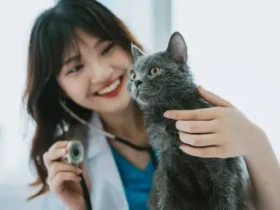Introduction
The COVID-19 pandemic has affected not only humans but also the animals living alongside us. Early in the pandemic, there were reports of cats contracting coronavirus, leading to significant concern among pet owners. Recent studies suggest that the prevalence of coronavirus among cats might be higher than originally thought. This blog explores the latest research, implications for feline health, and what pet owners need to know to keep their cats safe.
The Emergence of Coronavirus in Cats
The initial cases of coronavirus in cats were relatively rare and largely confined to a few isolated incidents. The first documented cases were reported in early 2020 when a tiger in a New York zoo tested positive for COVID-19, followed by reports of domestic cats in various locations showing symptoms.
Early Observations
- Initial Cases: In the early months of the pandemic, only a handful of cases were reported in cats. These cases were primarily in areas with high human infection rates, suggesting that the virus was transmitted from humans to pets.
- Symptoms in Cats: Cats that tested positive for coronavirus exhibited a range of symptoms, including respiratory issues, coughs, and lethargy. Some cats showed no symptoms at all, making it challenging to diagnose and track the virus.
New Research and Findings
Recent studies have shed light on the extent of coronavirus exposure in cats. Research has shown that the virus may be more widespread among cats than previously believed. Here’s what the latest studies reveal:
Increased Prevalence
- Serological Surveys: Recent serological surveys, which test for antibodies to the virus, indicate that a larger percentage of cats may have been exposed to coronavirus. These studies suggest that many cats who were asymptomatic or had mild symptoms might have had the virus.
- Infection Rates: Data from veterinary clinics and animal shelters have revealed higher rates of coronavirus in cats than initially thought. These findings suggest that cats, particularly those in close contact with infected humans, are at a higher risk of contracting the virus.
Transmission and Spread
- Human-to-Cat Transmission: The primary route of transmission appears to be from infected humans to cats. Cases where cats tested positive for coronavirus were often linked to households with confirmed human cases.
- Cat-to-Cat Transmission: While less common, there is evidence suggesting that cats can transmit the virus to other cats. Studies have shown that close contact between infected and healthy cats can lead to transmission.
Symptoms and Diagnosis
Understanding the symptoms and diagnosis of coronavirus in cats is crucial for timely intervention. Symptoms can vary widely, and some cats may not show any signs at all. Here’s what to look for:
Common Symptoms
- Respiratory Issues: Similar to humans, infected cats may exhibit respiratory symptoms such as coughing, sneezing, or a runny nose.
- Fever and Lethargy: Affected cats may develop a fever and show signs of lethargy or decreased activity.
- Gastrointestinal Symptoms: Some cats may experience gastrointestinal issues, including vomiting or diarrhea.
Diagnostic Methods
- PCR Testing: Polymerase chain reaction (PCR) tests can detect the presence of viral RNA in a cat’s respiratory secretions. This test is typically used for diagnosing active infections.
- Serological Testing: Serological tests detect antibodies produced in response to the virus. These tests are useful for identifying past infections or exposure to the virus.
Precautions and Preventive Measures
Given the increased prevalence of coronavirus in cats, taking precautions to protect your feline friends is essential. Here are some guidelines to follow:
Protecting Your Cat
- Minimize Contact with Infected Individuals: If you or someone in your household is diagnosed with COVID-19, limit contact with your cat. Avoid petting, cuddling, or letting your cat sleep in your bed.
- Good Hygiene Practices: Wash your hands thoroughly before and after handling your cat. Avoid touching your face and maintain good respiratory hygiene, such as covering coughs and sneezes.
- Isolation of Sick Cats: If your cat shows symptoms of illness, isolate them from other pets and seek veterinary care. Inform your veterinarian if you or someone in your household has COVID-19.
Veterinary Care
- Regular Check-ups: Ensure your cat has regular veterinary check-ups to monitor their overall health. Inform your vet if your cat has been exposed to someone with COVID-19 or shows symptoms of illness.
- Vaccination: While there is no specific COVID-19 vaccine for cats, keeping your cat’s vaccinations up to date can help protect them from other respiratory infections.
Impact on Cat Health
The potential for increased coronavirus exposure in cats raises important questions about feline health and welfare. Here’s what we know:
Long-Term Health Effects
- Mild or Asymptomatic Cases: Many cats that contract coronavirus have mild or asymptomatic cases and recover fully without complications.
- Potential Complications: In rare cases, cats may experience complications or prolonged health issues related to the virus. Ongoing research is needed to understand the long-term effects of coronavirus on feline health.
Psychological and Behavioral Effects
- Stress and Anxiety: The presence of illness in the household can cause stress and anxiety in pets. Ensure that your cat has a comfortable and safe environment, especially if there are changes in their routine due to illness.
- Behavioral Changes: Monitor your cat for any changes in behavior, such as increased hiding or changes in appetite. Behavioral changes can be a sign of illness or stress.
Conclusion
The recent findings indicating that more cats may have been exposed to coronavirus than initially thought highlight the need for increased awareness and vigilance. While most cats that contract the virus experience mild symptoms or none at all, it is crucial to take preventive measures to protect your feline companions.
By following the recommended precautions, maintaining good hygiene, and seeking timely veterinary care, you can help ensure the health and safety of your cat in these uncertain times. Stay informed, keep your cat’s well-being in mind, and consult with your veterinarian if you have any concerns about your pet’s health.











Leave a Reply